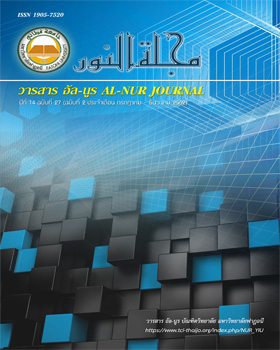การวิเคราะห์องค์ประกอบคุณลักษณะผู้นำตามหลักการอิสลามของผู้บริหารโรงเรียน เอกชนสอนศาสนาอิสลามในสามจังหวัดชายแดนภาคใต้
คำสำคัญ:
การวิเคราะห์องค์ประกอบ, คุณลักษณะผู้นำ, ตามหลักการอิสลาม, ผู้บริหารบทคัดย่อ
การวิจัยครั้งนี้เป็นการวิจัยเชิงสำรวจ (Exploratory Research) มีวัตถุประสงค์เพื่อวิเคราะห์องค์ประกอบคุณลักษณะผู้นำตามหลักการอิสลามของผู้บริหารโรงเรียนเอกชนสอนศาสนาอิสลามในจังหวัดชายแดนภาคใต้ กลุ่มตัวอย่างที่ใช้ในการวิจัยได้แก่หัวหน้าฝ่าย และครูผู้สอนจำนวน 649 คนใช้แบบสอบถามในการเก็บรวบรวมข้อมูลใช้การวิเคราะห์องค์ประกอบเชิงสำรวจ(ExploratoryFactor Analysis) ผลการวิจัยพบว่าองค์ประกอบคุณลักษณะผู้นำตามหลักการอิสลามของผู้บริหารโรงเรียนเอกชนสอนศาสนาอิสลามในสามจังหวัดชายแดนภาคใต้ประกอบด้วย 1) ด้านความรู้และทักษะการบริหาร (Fathonah) 2) ด้านการมีหลักศรัทธาที่ถูกต้อง และบริสุทธิ์ใจ (AqidqhSalimah&Ikhlas) 3) ด้านความสัจจริงและเป็นที่ไว้วางใจ (Sidiq&Amanah) 4) ด้านมารยาทททางสังคม (AkhlakulKarimah) 5) ด้านการเผยแผ่ และการสื่อสารคำสอนอิสลาม (Tabligh) 6) ด้านกายภาพ และสุขภาพ และ (Jasadiyah&SIhhiyah) และ 7) ด้านการประชุมปรึกษาหารือแบบอิสลาม (Syura)
เอกสารอ้างอิง
Hayihama, A. (2010). Characteristics of Islamic Private School Administrators in Tree Southern Borders Provinces.Master Thesis. Prince of Songkhla University.
Budiharto, S. &Himan, F. (2006). The theoretical Constructs and Perceptual Measurements of Prophetic Leadership.Journal of Gajah Mada University, 33(2), 133.
Fauzan, A. N. &Budiharto, S. (2009). The Relationship between Perceptions of the Superior Leadership of Employees and Employees. Master Thesis. Indonesian Islamic University.
Indonesia,R. (2011).The Holy Al-Quran. Jakarta: Indonesia Republic Press.
Kao-ian, J. (2013). Relationship between Leadership and Administrative Performance of Educational Administrators in Three Southern Border Provinces. Journal of Yala Rajabhat University, 8(1),40-51.(in Thai)
Pahlawan, K, K. (2005). Islamic Leadership and da wah.ED. 1, Jakarta, Amzah.
Saleh, A.M J,(2006).Educational Administration : An Islamic Perspective. IBS Islamic Book Store.
Sin, A.I.A. (1993). Al Idaroh Fil Islam. Khurthum, DarussaqofahLithaba ah Wan Nushur.
Siljaru, T, (2013). Statistical Analysis and Research with SPSS and AMOS. Bangkok, Business R & D.
Taufan, A. B. &Budiharto, S. (2008) The Proses of Prophetic Leadership Development. Master Thesis. Indonesian Islamic University.
Zulaikhah, S. (2005).Education Leadership Model of the Prophet Muhammad (Study About Traits Prophetic). The Islamic Religious Institute of Walisogo Semarang at MIN Malang.



